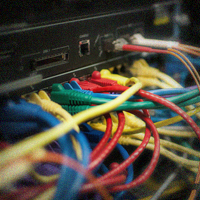Is Colocation Right for Your Enterprise?
 While most Internet savvy people have heard about data centers, many don’t know what it means to colocate servers in one, why they’d want to, or how to when it makes good business sense for them to do so.
While most Internet savvy people have heard about data centers, many don’t know what it means to colocate servers in one, why they’d want to, or how to when it makes good business sense for them to do so.
Why would you need to colocate?
Virtually all web sites you visit online are hosted in data centers. Companies can either choose to build their own data center or colocate in one built by a company with the expertise. Data centers provide an ideal environment for computers connected to the Internet and provide space, power, cooling, and an Internet connection. Paying for access to this advanced infrastructure is called “colocation.”
What are the advantages?
The infrastructure required to ensure uninterrupted data and power to servers requires significant expertise and resources so it can be much more cost effective to pay for access to such facilities. As well, trying to run servers from a “closet” in your office is also risky since you could suffer downtime if you don’t provision sufficiently for reliable power, cooling, and data transmission.
While cloud computing is an excellent choice for hosting applications on common platforms, what about the custom servers and software you have built in-house over the years? It can be much easier to migrate your custom inventory or billing application from under your accountant’s desk and over to a data center than trying to get it to run on Amazon’s EC2.
What equipment would you need?
The short answer is whatever you’re using currently at your office might suffice. At a minimum, you need at least one server and a network switch. Often, SMBs will start with only one or two servers in an open rack and then grow their footprint into a secure cabinet as their company grows. Some of our largest customers had such humble beginnings.
What scenarios are best for colocation?
A key benefit is the flexibility available since you still have full control over the hardware. A business often will have those custom or legacy apps which can’t fit in a traditional cloud hosting environment. The CTO knows that hosting customer facing servers in-house isn’t a reliable long term strategy so simply moving the existing gear into a data center can be an easy and sensible solution.
Data centers are also very good solutions for off site data backups, in particular if your business has multiple terabytes of data to back up. While cloud backup services can provide a simple solution for backing up your data off site it quickly becomes quite expensive if you have a lot of data. In contrast, hosting one or more backup servers in a colocation facility can be cost effective and reliable.
If reliability is essential for your business then hosting some of your critical data and services in a data center can be a key part of a solid disaster recovery solution. Even if your web site is hosted with a cloud provider, keep a backup copy in a data center on a web server that’s ready to host your company’s web site should that cloud provider go down for any reason.
Keeping all of your company’s important data off site should be part of any sensible business continuity plan. What happens if one of your offices burn down or is flooded? Even if your staff at that location can work from home, how can they access their files? How about staffers at your other office locations? If you’re replicating your file server(s) in a data center then you have a solid business continuity plan.
What’s next?
Conduct an internal review of your hosting and disaster recovery strategies, which you should be doing annually already.
- Are you hosting anything customer facing in your offices? Move it to a colocation facility or the cloud.
- Are you maintaining off site backups that you can use if you lose one of your offices? If not, would colocating off site backup servers in a data center best bring you peace of mind?
- Are you hosting in the cloud but lack redundancy if the cloud solution goes offline? Consider running a copy of your critical web site in standby on a web server in a data center.
Any questions or comments?
Contact us and we’ll be happy to have a conversation to help you make the most informed decisions for your particular needs. Any recommendations for other helpful uses for colocation? Leave a comment below.
Grant Sperry works at XMission overseeing operations and colocation. Established back in 1993, XMission was an early Internet pioneer and continues to provide amazing products and personalized service. If you like what we’re doing, contact us to see how we can help your company thrive.
Zimbra Server Admin Tip: Mailbox Password Migration and Server Settings Comparison An honest discussion about data privacy, open source, and communications security.
Comments are currently closed.
I don’t know much about colocation, but this was a really informative article. For instance, I assumed that it was going to require complicated equipment, but knowing that what I have at my office would probably work is amazing. I’ll have to look into this further but this was a great introduction to the subject, thank you for the useful information.